- Home
- Tom Savage
A Penny for the Hangman
A Penny for the Hangman Read online
A Penny for the Hangman is a work of fiction. Names, characters, places, and incidents are the products of the author’s imagination or are used fictitiously. Any resemblance to actual events, locales, or persons, living or dead, is entirely coincidental.
An Alibi eBook Original
Copyright © 2014 by Tom Savage
All rights reserved.
Published in the United States by Alibi, an imprint of Random House, a division of Random House LLC, a Penguin Random House Company, New York.
ALIBI and the ALIBI colophon are trademarks of Random House LLC.
eBook ISBN 9780804178204
Cover design: Caroline Teagle
Cover images: sky © Rod Pforr/Getty Images, shoreline © Benjamin Howell/Getty Images
www.readalibi.com
v4.0
ep
Contents
Cover
Title Page
Copyright
Epigraph
Rodney Harper’s Diary
New York City
King’s Gambit
Chapter One
Chapter Two
Chapter Three
Chapter Four
Mating Net
Chapter Five
Chapter Six
Chapter Seven
New York City
Isolated Pawn
Chapter Eight
Chapter Nine
Chapter Ten
Distant Opposition
Chapter Eleven
Chapter Twelve
Chapter Thirteen
Chapter Fourteen
New York City
Dedication
Acknowledgments
About the Author
The chessboard is the world, the pieces are the phenomena of the universe, the rules of the game are what we call the laws of Nature. The player on the other side is hidden from us.
—THOMAS HENRY HUXLEY
Rodney Harper’s Diary
MAY 26, 1958
This is a day unlike any other day, ever, in the history of the world. It is my birthday, and it is my new beginning. I, Rodney Lawson Harper, am 15 years old today, and I have a wonderful plan. I must write it down. The ideas are arriving so thick and fast, my mind is so feverish with them, that it is all my hand can do to keep up with my head. But my hand will prevail. As on a chessboard before a match, I’ll set the pieces out in order, row on row. Everything will be perfect.
Wulf doesn’t know yet, but soon I’ll take him to the Secret Place and tell him. He’ll be scared at first, but he’ll do what I tell him to do. He hates them as much as I—more, maybe. He never beats me at chess because he can’t see the next moves coming; he doesn’t understand the game as I do. I shall use him as my pawn, my rook, my knight—my shining, blond-haired, golden-skinned knight. He will be my Jonathan, my Lancelot, my good right arm. He’ll do it because he loves me.
On this day, this BIRTH day, I promise DEATH, the most famous event in the history of the Virgin Islands. Oh, what a triumph it will be! A glistening, wet, red triumph…
New York City
Karen Tyler’s Journal
Greenwich Village
FEBRUARY 28, 2009
He called again tonight, and this time he said he was Deep Throat. The last time he called, he was “a little birdie.” That must fit in with his sense of humor—perhaps I should say their sense of humor. I don’t know which one of them he is. But he’s one of the two—I’m sure of it. Why else would he be doing this? Thanks to him, I’m on my way to St. Thomas next week, staying at the Frenchman’s Reef and Morning Star Marriott Beach Resort until I hear from him.
I’ve never been to St. Thomas, but Jim says “the Reef” is very fancy. He’s been there, natch—Jim’s been everywhere—and he says everyone just calls it “the Reef.” Jim’s in the bedroom at the moment, snoring to beat the band, and I’m out here in the living/dining/office/everything else room, alone with his snoring and my laptop and a big bag of peanut M&Ms, and Ruth, who is curled up asleep on her favorite cushion.
Okay, I must get organized here. I’ve already mapped out the first two sections of the four-parter I’m doing about the two of them, and I want to finish writing the first part. I’ll work on that tomorrow and hand it in Monday morning for next week’s issue. Then I have to finish the pieces on Tarantino and Sondheim and have them on Sally’s desk by 5 p.m. Wednesday. I also have to pack for the trip down there. It’s 38° here right now, but it’s 82° in the Virgin Islands. Eek! (Note: Ask Gwen where to get upscale clothes in NYC in March. If anyone knows, she will.)
Stop snoring, Jim! Jeez Louise!!!
Sooo…he called again tonight. That’s his third call in a month, and I still don’t know who he is. He won’t tell me, and he won’t tell me where he is, either, and I can’t trace his calls. I’m just supposed to wait at the Reef until he contacts me. I understand all the secrecy. If I were one of them, I sure as hell wouldn’t tell a reporter anything until I knew her better. He says he chose me because he’s a fan of my work. I can’t say no to that.
Could he be Wulf? He was the handsome one. Well, they were both handsome, but Rodney was pale and dark-haired and intense. Scary, really. Wulf was gorgeous, blond, and Nordic. They both had blue eyes—that’s one detail they got right in the new movie. Those two young actors playing Wulf and Rodney look exactly like them. At least I assume they do. I only have these old photos to go by, but the filmmakers would have been working from these same photos, and they obviously took pains to make everything as authentic as possible. The physical things, anyway. As for the rest of it, the replication of the actual events—well, I suspect that’s why my caller wants to talk to me.
If he’s Wulf, he’s 64 now. I wonder what the years have done to him, how he’s managed all this time. Rodney would be 65. He was 15—one year older than Wulf—when it happened 50 years ago, on Friday, March 13, 1959….
—
That was an excerpt from the computer journal of Karen Tyler. I think it gives a vivid impression of the woman, more vivid than I could manage with a few terse sentences describing her. She was twenty-seven years old when she wrote it, one week before she went to the Virgin Islands. I saw her off at Kennedy on Sunday, March 8, 2009. She kissed me and held me against her for a moment, warm and blond and flower-scented, and then she grinned and walked away down that long corridor, her shoulder bag and laptop case swinging jauntily at her sides, eagerly anticipating her great adventure.
My name is James O’Brien—Jim—and I am the famous snorer of the journal entry. I had been living with Karen here in my apartment in Greenwich Village for nearly three years, and we were just beginning to talk about marriage and a bigger place and starting a family. Well, I was, anyway. She always seemed to resist the idea. I don’t think it was me. Karen didn’t want to marry anyone, and now I think I know why.
Like me, Karen was born and raised in New York City. Her mother had been her only relative, and Grace Tyler died of an aneurysm at the age of forty-seven, when Karen was eighteen. Grace didn’t marry Karen’s father, and she never told Karen who he was, saying only that he’d died in a car accident before Karen was born. Grace was a receptionist at a law firm on Madison Avenue, and she wasn’t able to put aside much money, but she did manage to buy the four-room apartment on West End Avenue and 81st Street where Karen had lived all her life. After her mother’s death, Karen sold the apartment to pay her tuition at New York University.
She always loved the news, particularly entertainment news, and she was determined to be a journalist. She was active with her high school newspaper and the NYU publications, reporting on her favorite things: books, theater, movies, television. She was attracted to the excitement of celebrities and to t
he details of their stories. This may be five-cent psychiatry, but perhaps knowing so little of her own history caused her to find a particular glamour in the lives of other people.
We met through work. Karen was a staff reporter at Visions, that upscale weekly entertainment magazine for serious book lovers, theater snobs, and cinephiles. Her first job out of college had been an apprentice gig at a famous newspaper, but she quit after six months when she realized she would never rise much higher than the mail room there. Sally Cohen, the managing editor at Visions, noted Karen’s bright, straightforward attitude at the job interview, but she didn’t immediately hire her. Instead, she handed her an assignment on spec and told her to bring back a printable story. If Sally liked it, Karen would get the job.
I was that story. My first novel had just been published, and Karen took me to lunch for an interview. I was young and well-off and fairly successful, though not as successful as my dad, the really famous novelist. I was living here, in my newly purchased Village co-op, trying to think great thoughts and write soon-to-be-great books when I wasn’t prowling around with my buddies and dating several women. Dad, that literary lion, smiled and shook his head at my bachelor ways, and my mother sighed and waited patiently for me to arrive at their Upper East Side town house with Ms. Right on my arm. She didn’t have long to wait for that.
I liked Karen Tyler from the moment she walked into the restaurant that afternoon, and by the time lunch was over I was in love with her. I don’t remember what I ate, if I ate, because I was so struck, so overwhelmed by the tall, slender, grinning, blue-eyed blonde in the blue dress. It was my first interview for the press, such as she was, and I was a bit full of myself, but she and her laughing eyes knocked that out of me in a matter of minutes. She asked all the right questions about my novel, smiling and nodding in all the right places, and then we talked about other things. We seemed to like and hate all the same books, films, plays, and politicians, and we discovered that we were both Mets fans. We clicked.
I invited her to dinner at One If By Land the next night, which impressed the hell out of her, and in the following week we went to a Hitchcock revival at Film Forum and a Mets game. My parents liked her, and her cat, Ruth Rendell, curled up in my lap and went to sleep the first time I sat down in her apartment, apparently an unprecedented honor. Three months later, Karen left the cramped SoHo place she shared with two other women to move in here with me, and she brought Ruth with her. What followed were the happiest three years of my life, and I hope they were as happy for her. She had an exciting job, several good friends, her cat, her peanut M&Ms, the mystery novels she was forever reading, and—well, me. Everything was fine.
Then, one evening in February of 2009, Karen received the first of three phone calls from an unidentified man who claimed to have a career-making story to tell her. She was always getting calls in relation to her work at the magazine, from various spies and gossipmongers in the arts and entertainment world, but this one was different. For one thing, he called her here, at home, on our private, unlisted number—I have no idea how he obtained it. For another, it was her birthday, February 10. And the call wasn’t about arts or entertainment but murder. The mystery man was offering to tell Karen “the truth behind the lies” surrounding an infamous old crime. He was referring to the Harper/Anderman case, those two boys in the Virgin Islands back in the 1950s.
I can’t bring myself to say “As luck would have it,” so I won’t. There was no luck in this. As fate would have it, that new movie about the case, Bad Boys, was set to open on Friday, March 13, 2009, fifty years to the day after the actual event. The movie was already big news, with its Oscar-winning director and all-star cast, and the two exciting new teen actors who played Harper and Anderman. They’d filmed it in St. Thomas, using many of the authentic locations. When Karen told her bosses at Visions magazine about the phone call, they were ecstatic. The story would be a perfect tie-in with the release of the hottest movie of the season.
Two weeks later, the mystery man called Karen again, and by then she had the green light from Sally Cohen. Karen was ready to hear his story, but he refused to discuss it on the phone. He told her she must come to him if she wanted it. He called a third time, on February 28, to confirm their appointment.
Karen collected a virtual library of information about the 1959 incident, and she was fascinated by it. She attended a trade screening of Bad Boys, and afterward she interviewed the director and screenwriter. She tracked down several people who’d known the two boys. She was writing a series of articles for the magazine, even talking about possibly assembling them into a book. There had already been five nonfiction books, a thinly veiled novel, a Broadway play, a TV miniseries, and two theatrical films based on the case, but Karen said she’d have a big advantage over all of them. The two boys had vanished after their release from prison years before, and they’d never spoken to any of those other writers. Karen was convinced that her caller was actually one of the boys, either Rodney Harper or Wulf Anderman.
I should have gone down there with her. I offered, but she wouldn’t hear of it, and neither would her mysterious contact. Karen said it was no big deal, she’d be back in a few days, and how could an old man possibly be a threat to her, anyway? Besides, she’d have a photographer with her, so she’d be fine. That’s what she believed, and I believed it, too.
Here’s how I’m going to do this: I’ll start with one of the Visions articles Karen wrote, the projected first chapter of the book she will never finish. Then I’ll finish her book for her, and I’ll use everything I’ve found here to help me. I have her notes and her computer journal going all the way back to college, as well as the books and documents she consulted.
And I have something else: an old black-and-white marbled school composition book filled with careful handwriting and smudged in places with faint black stains of dried blood. This is the diary of Rodney Harper, a journal he kept as a teenager in the months leading up to the incident. The diary arrived here a week after Karen went down there, in a box addressed to me, along with a battered-looking wooden chess set and several other items I’ll explain later. They’ve been entrusted to me, so I assume that I’m free to use them as I see fit.
Well, I shall use them. It’s taken me years to work up the courage, but now I’m ready. I’ll arrange Karen’s eager work and Rodney Harper’s diary and the reports from 1959, and I’ll fill in the rest myself, the events of March 2009, which I can only think of as the Harper/Anderman Golden Anniversary. I will tell their story.
Karen’s story.
King’s Gambit
MONDAY, MARCH 9 TO WEDNESDAY, MARCH 11, 2009
Chapter One
“Paradise Lost”
by Karen Tyler
Everyone is capable of murder. The urge to kill can infect anyone, at any time. Murderers may be the least likely people, their prey the least likely targets, and their killing grounds the least likely crime scenes imaginable.
There is a house on a hill in St. Thomas, Virgin Islands, a big stone plantation manor called Tamarind in honor of the fruit trees that line its long front drive. From the spacious wood verandas and flagstone patios of the mansion, you can gaze out across the sloping lawn at the harbor, at the distant city of Charlotte Amalie nestled by the water’s edge, and up at the mountains behind it. On a fine afternoon, this lavish panorama takes the breath away from even the most jaded viewer.
St. Thomas is among the greatest natural wonders of the world, floating in the sunlit strait where the deep aquamarine of the Atlantic Ocean becomes the clear turquoise of the Caribbean Sea. It rises majestically up from the water, bright green against the bright blue sky, its thickly wooded mountains ringed by beaches of fine white sand. On January 17, 1917, St. Thomas and its two equally lovely neighboring islands were purchased from Denmark by the United States, and they became our most stunning possessions: “America’s Paradise.”
As in the original Paradise, this one had a serpent—or, to be precise, two
serpents. On Friday, March 13, 1959, forty-two years after Americanization, the perfection of the Virgin Islands was marred by one of the most shocking incidents of the twentieth century. That it occurred at all was dreadful; that it occurred in such a beautiful setting was obscene. But the single most disturbing aspect of this outrageous crime was the fact that it was committed by children.
—
Karen looked up from the glossy white magazine page and out at the magnificent vista from the hotel terrace, smiling to herself at how accurately she’d managed to describe it without ever having seen it. Now that the view was actually here before her, she liked her own choice of words. This wasn’t exactly the view from Tamarind—the house was on the next point of land, closer to the harbor city—but it was the same angle from a slightly greater distance. She zeroed in, focused, from the island in general to the specific rooftop of the mansion on the hill between her and the town, studying it through the tops of the trees. If the man who’d summoned her here didn’t want to begin the interview right away, she’d go to Tamarind tomorrow and have a look around the scene of the crime.
She glanced down at her cell phone beside the frosted mug of tropical fruit punch on the glass-topped, umbrella-shaded patio table. No call yet, even though she’d arrived on the island last night, some eighteen hours ago. Oh, well, he was running this show, whoever he was.
She knew he was not Mr. T. H. Huxley. That was the name on the fruit basket she’d found waiting in her room when she checked in last night. The hotel, of course, would tell her nothing. Whoever had arranged for the basket had apparently demanded anonymity, and the Marriott people were honoring his wish. This morning Karen had asked the clerk behind the front desk if a Mr. Huxley had left word for her, and he said there were no messages. Karen could tell from the man’s expression that he’d never heard of Mr. Huxley. Interesting…

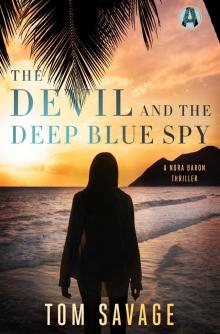 The Devil and the Deep Blue Spy
The Devil and the Deep Blue Spy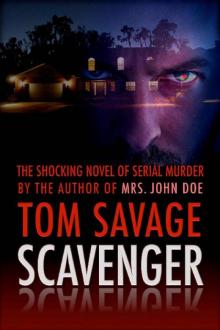 Scavenger
Scavenger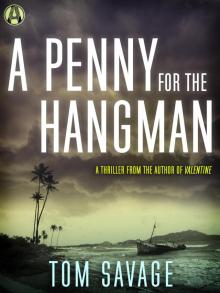 A Penny for the Hangman
A Penny for the Hangman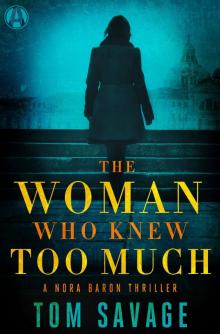 The Woman Who Knew Too Much
The Woman Who Knew Too Much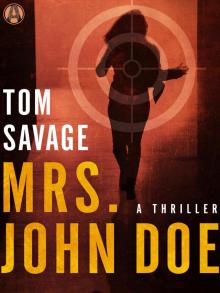 Mrs. John Doe
Mrs. John Doe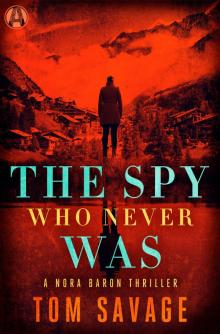 The Spy Who Never Was
The Spy Who Never Was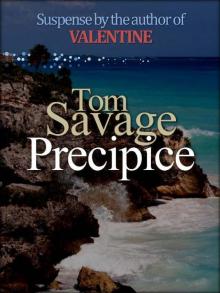 Precipice
Precipice